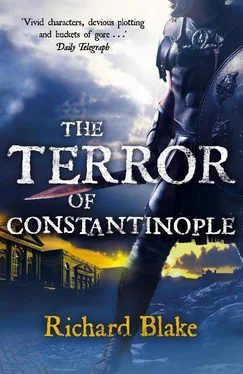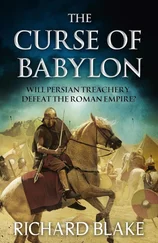Richard Blake - The Terror of Constantinople
Здесь есть возможность читать онлайн «Richard Blake - The Terror of Constantinople» весь текст электронной книги совершенно бесплатно (целиком полную версию без сокращений). В некоторых случаях можно слушать аудио, скачать через торрент в формате fb2 и присутствует краткое содержание. Жанр: Исторические приключения, на английском языке. Описание произведения, (предисловие) а так же отзывы посетителей доступны на портале библиотеки ЛибКат.
- Название:The Terror of Constantinople
- Автор:
- Жанр:
- Год:неизвестен
- ISBN:нет данных
- Рейтинг книги:5 / 5. Голосов: 1
-
Избранное:Добавить в избранное
- Отзывы:
-
Ваша оценка:
- 100
- 1
- 2
- 3
- 4
- 5
The Terror of Constantinople: краткое содержание, описание и аннотация
Предлагаем к чтению аннотацию, описание, краткое содержание или предисловие (зависит от того, что написал сам автор книги «The Terror of Constantinople»). Если вы не нашли необходимую информацию о книге — напишите в комментариях, мы постараемся отыскать её.
The Terror of Constantinople — читать онлайн бесплатно полную книгу (весь текст) целиком
Ниже представлен текст книги, разбитый по страницам. Система сохранения места последней прочитанной страницы, позволяет с удобством читать онлайн бесплатно книгу «The Terror of Constantinople», без необходимости каждый раз заново искать на чём Вы остановились. Поставьте закладку, и сможете в любой момент перейти на страницу, на которой закончили чтение.
Интервал:
Закладка:
‘I thought I’d know where to find him,’ said Martin once we’d broken for drinks and a bite to eat. ‘I found him with his bags already packed. He and Alypius were planning to get themselves out of the city dressed as monks. They’d have been halfway to Damascus before anyone would have missed them. They’d have been across the frontier into Arabia before anyone could have caught up with them.’
Somewhere behind me, Baruch was lecturing a slave on the dietary requirements of his restored faith. They seemed to exclude most of the breakfast buffet. Luckily, Moses had said nothing in particular against wine.
I looked at the severed head of Theophanes. Without his animating spirit it was just one more saggy ball of flesh and bone. The eyes were already dull. The worn teeth poked forward above the drooping lower lip.
Phocas still looked like Phocas. Theophanes was already gone.
‘What threats did you use?’ I asked.
‘None,’ said Martin. ‘I simply described the situation and asked for his help.’
‘And he came?’ I asked again. ‘He simply came at your request?’
‘He sat thinking a while,’ Martin said slowly. ‘We discussed what else might be done to get you and the child reunited and out of trouble. In the end, though – and there was a big argument over this in their own language – he ordered Alypius to go off alone. Then he came with me down to the shore.’
‘Was it a fast death?’ I asked. The head was neatly severed, but gave no indication of what might have been done first to the body.
‘As fast as anyone could wish,’ said Martin. ‘The deal I brokered was that Theophanes handed himself over. In return, Priscus surrendered the child, you got kicked out of the Empire, and Theophanes was put to death without torture.
‘Unlike with Phocas, Heraclius didn’t strike the killing blow himself, but it was done with so much skill, I didn’t realise at first the sword had passed clean through his neck.’
‘He gave me a message to pass on to you,’ Martin continued after a pause. ‘He said to remind you of the promise he made. He also said: “If I now give my body to be burned, I do so with charity”.’
I said nothing, but continued to gaze at the head. You shouldn’t weep for a man like Theophanes. How many tears had been shed over his actions? That labyrinth under the Ministry had long since been his second home. His company was fine enough from across a dinner table. It must have been something else from the bed of a rack.
And his final service to the Empire might well have served to divide it. In exchange for that roll of parchment, all made out in proper order, he’d arranged for Phocas to be shipped out of the city under Church protection and set down in one of the monasteries outside Canterbury. There, Phocas would have been a standing challenge to Heraclius. The Church would only have had to say the word and there’d have been rebellions all over the West.
To avoid the possible loss of Italy and his native Africa, Heraclius would have been tied to Rome in all matters of doctrine and authority.
How long the Eastern Provinces would have stood for that – especially with the Persians running wild – is anyone’s guess. Perhaps the Phocas challenge would have sunk without trace. But it might have split the Empire, leaving a Greek core, the other parts moving off in different directions.
That this had now been achieved by the Saracens, from whom Theophanes was snatched as a child, is one of the curiosities of history.
Perhaps it would have been better for the world if the inevitable that I’ve spent much of my life trying to put off had happened at one stroke. Perhaps Theophanes was after all a faithful servant of the Empire.
I couldn’t know that as I stood looking at his severed head. While you shouldn’t weep for a man like that, I had to fight myself not to. How he must have dreamed of a return to the burning wilderness of his childhood – free to pass the remainder of his life without lies or betrayal. He’d come so close to that. Then he’d given it all up for the child of his own worst enemy and for a barbarian who’d tried his hardest, without knowing what it was, to wreck his plan.
I reached forward and pulled the eyes shut. Then I took Maximin in my arms.
Now that the sun was up, a whole flotilla had set out from the shore. It was obvious even to the most cautious or foolish of the better classes who was the undisputed victor. I could already hear the salutations and cries of loyalty.
Whether they now raced against each other not to be last on that purple carpet, or stayed on shore to greet the Saviour on his entry into the City, all would be welcomed – with a few named exceptions, and a slightly larger number of others who would be disposed of before the coronation.
Behind me, I heard Baruch offering round his ivory cards and explaining the precise location of his bank. There can be advantages, you’ll agree, in being the first.
66
Once again, the Dispensator avoided looking me in the eye.
‘I wanted you there’, he said for the third time, ‘to secure the best outcome for the Church.’
All over Rome, the bells were ringing for Christmas Day. A steady drizzle since dawn had taken the fun out of the processions. But there was feasting and dancing and general good cheer within doors.
Or there was in all places but the Lateran. The great spider that lurked at the centre of the extended web of the Roman Church was taking no rest from its continual watch over the whole, or from its spinning of new threads to secure still more power for itself.
‘You cannot imagine, my dear Aelric,’ the Dispensator said, ‘how those coded reports I kept getting from Silas alarmed me. I agreed in principle that any price was worth paying to get our Patent of Universality. But the deal Silas proposed was potentially ruinous. It would have been ruinous had it come unstuck. It might have been still more ruinous had it succeeded.
‘Holding Phocas might have been useful for us – but not in England.
‘I hardly need remind you that England belongs to the Church as a religious asset. With England as a direct province of Rome, the whole of the West can be ours until Judgement Day. We can hold it against all heresies that exist or may arise. It is therefore important that England should not be embroiled in merely Imperial politics.
‘There was no chance that Heraclius or any other Emperor could invade England. But the use of England as a place of refuge for Phocas would have worked a diplomatic revolution throughout the West. The Lombard and Frankish courts would have swarmed with Imperial agents – and, for all I know, agents of the Persian King. The northern kingdoms of England would have been locked into the new diplomatic system. Even the Irish would not have been left out.
‘We needed the title of Universal Bishop – but not at the expense of losing all that made it worth having. England is ours. We will not share it with anyone. We will not risk having to fight for it. We will compromise in nothing – not even for the considerable short-term advantage we might have obtained.’
The Dispensator paused and looked again at the Patent of Universality I’d put on his desk.
‘On the other hand,’ he said with a change of tone, ‘Silas had actually opened a negotiation that seemed likely to give us the title. For the first time, we were told that no declaration against Heraclius would be required. Phocas had abandoned hope of saving his throne. All that interested him now was finding some place of refuge beyond the reach of Heraclius.
‘You don’t refuse a bargain just because the price is not currently the one you are willing to pay. And this was a price that might, with proper management, be wholly avoided.
Читать дальшеИнтервал:
Закладка:
Похожие книги на «The Terror of Constantinople»
Представляем Вашему вниманию похожие книги на «The Terror of Constantinople» списком для выбора. Мы отобрали схожую по названию и смыслу литературу в надежде предоставить читателям больше вариантов отыскать новые, интересные, ещё непрочитанные произведения.
Обсуждение, отзывы о книге «The Terror of Constantinople» и просто собственные мнения читателей. Оставьте ваши комментарии, напишите, что Вы думаете о произведении, его смысле или главных героях. Укажите что конкретно понравилось, а что нет, и почему Вы так считаете.












